Bright Colours, Tech and Ping Pong: A Day at Freshfields' Legal Services Hub in Manchester
Legal Week (and a dedicated photographer) took a tour of the Magic Circle firm's Manchester office to see how it compares with the London HQ.
July 18, 2019 at 04:50 AM
7 minute read
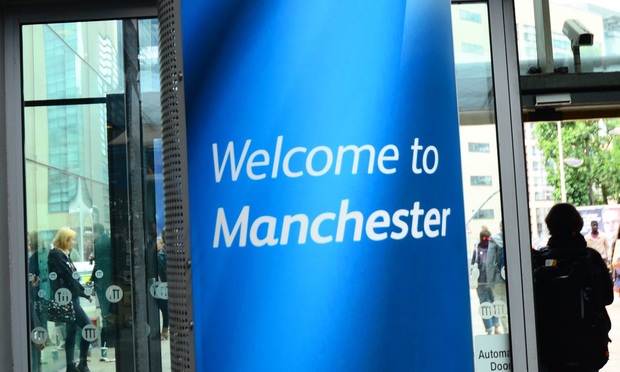 Credit: Flickr/Tecmark Ltd
Credit: Flickr/Tecmark Ltd
Legal services hubs are all the rage at the moment. Freshfields Bruckhaus Deringer has one in Manchester, Clifford Chance has one in Newcastle, and even Reed Smith has one in Leeds.
But what are they actually like? Legal Week took a trip to Freshfields' global centre at One New Bailey in Manchester to find out.
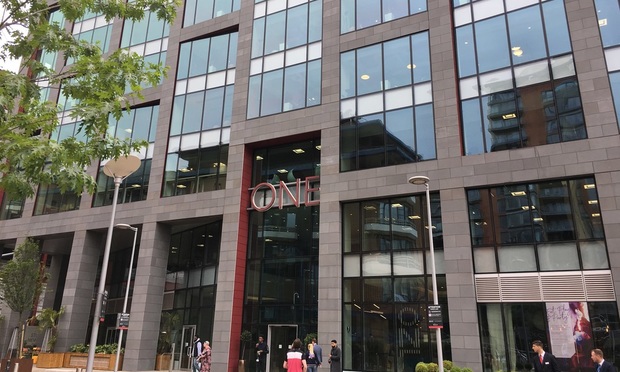 One New Bailey, Salford
One New Bailey, SalfordStraddling the border between Salford's new business district and Manchester's bustling Spinningfields development, the centre – a glimmering cube of glass and plastic – looks every bit as functional as the services it houses.
And it tallies with the image the firm is at pains to present – an office that is not some remote money-saving outpost in the sticks, but rather a simple extension of the Fleet Street HQ – albeit some 200 miles away. So keen is the firm to paint a glowing picture of the operation that a dedicated photographer is hired to accompany the Legal Week tour.
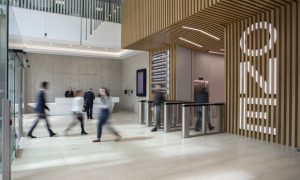 The foyer at One New Bailey
The foyer at One New BaileySince opening in 2015, the 750-strong operation has helped usher in a new era of north-shoring among law firms, forming a blueprint for similar moves by rivals. It hosts a number of the Magic Circle firm's support teams across accounting, HR and finance. But its big selling point is 'the Hub' – the first of six hub offices, which together employ 150 staff across locations in Frankfurt, Berlin, Hamburg, Duesseldorf and Hong Kong, besides Manchester.
Designed to provide legal support services to the firm's burgeoning global network, the Hub has for the last few years helped the firm's ability to deliver due diligence, document automation and AI-backed services to the firm's globally mobile lawyers.
 The firm is aiming for a startup feel
The firm is aiming for a startup feel"People + process + technology" is the mantra. And whatever this formula adds up to, lately it's resulted in the addition of the first-ever cohort of qualified lawyers and trainees, and the launch of a new app through which Freshfields lawyers the world over can access the Hub's services.
The Hub's new hires have been recruited out of local universities such as The University of Manchester, Manchester Metropolitan and others, and are now working variously as 'legal solutions specialists' and 'legal technologists'.
Inside the office, there is a manifestly youthful vibe. Young people in weekend getup float in and out of rainbow-coloured breakout rooms, huddle together in small teams and, when they aren't at their desks, avail themselves of a bistro-style canteen that offers anything from healthy legumes to deli meats, or the leisure area, complete with a ping-pong table swarmed by a diverse pocket of people on their break.
Our guide, centre director and co-founder Olivia Balson, says the aim was to create a startup feel.
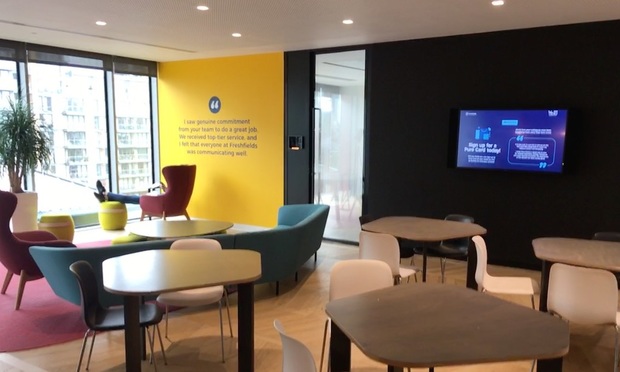 Walls with warm client words painted onto them are commonplace throughout the Hub
Walls with warm client words painted onto them are commonplace throughout the HubIn many ways, the centre bears little likeness to the HQ it supports. It is difficult to imagine a ping pong table taking pride of place at Fleet Street. And between the old City HQ and the Hub, the differences in atmosphere, personnel and overall tone are stark.
Lining the main office areas are side spaces packed with multicoloured seats and brightly painted walls emblazoning inspirational – albeit distinctly Freshfieldian – statements and kindly client testimonials.
But Balson and Christina Spenke, head of the Hub's continental Europe offices, are keen to emphasise the Hub's objective to work as "one global team" across all six Hub offices.
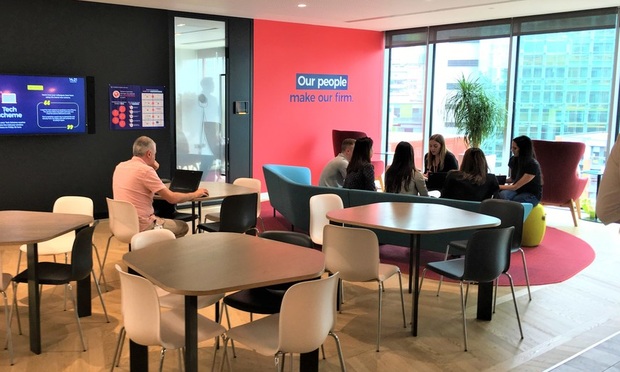 One of several shared spaces at the Hub
One of several shared spaces at the HubIn that ceaseless Freshfields work ethic, there is a clear harmony between Manchester and Fleet Street. The Hub, which works in more than 30 languages, operates on a 24/7 basis.
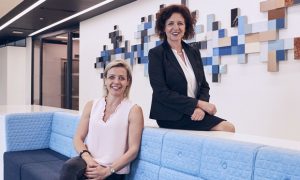 Global Services Centre director, Olivia Balson, and head of Freshfields Hub, Christina Spenke
Global Services Centre director, Olivia Balson, and head of Freshfields Hub, Christina SpenkeAnother common trait is discretion regarding client data. No photos were allowed in the Hub workspace itself. And ahead of Legal Week's visit, precautions were taken – sensitive client data was wiped from the perspex boards and, as we were forewarned, monitors were either locked… or switched to BBC Sport; the kind of vigilance you'd sooner expect to see at 65 Fleet Street.
The Hub's young staff hop between dual-monitored desks across an open-plan office, working in small, sector-focused, multilingual teams. Whiteboards line the walls, onto which words of encouragement and feedback are scribbled. And open spaces play host to Hub-wide huddles in which, Balson says, "shout outs" are given for individual efforts.
Also notable is the traffic-light system, whereby green and red magnets are placed next to photos of staff members to indicate availability for a particular project – clever, simple little systems that epitomise the Hub.
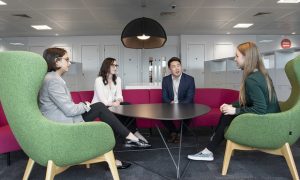 A 'Think Space' at the Hub
A 'Think Space' at the HubA primary focus for the Hub is working on large due diligence projects comprised in many of Freshfields' top mandates, from the least to the most complex. And one of the Hub's key technologies is Kira – a contract analysis tool that the firm uses to tear through gargantuan but repetitive document-loads, reviewing as many as 5,000 agreements a day for just one client and, the firm claims, achieving time savings of about 30%.
"You can tell Kira what you're looking for, and it looks at patterns of language – it learns," says one of the Hub's technologists, Zoe Gundersen.
But forget the 3D holograms or the Hollywood visuals. Like everything in the Hub – human or otherwise – Kira is there to serve a function and get the job done with speed.
How work is allocated has also been given a tech refresh. Freshfields' lawyers across the world can now make a request to the Hub via an app.
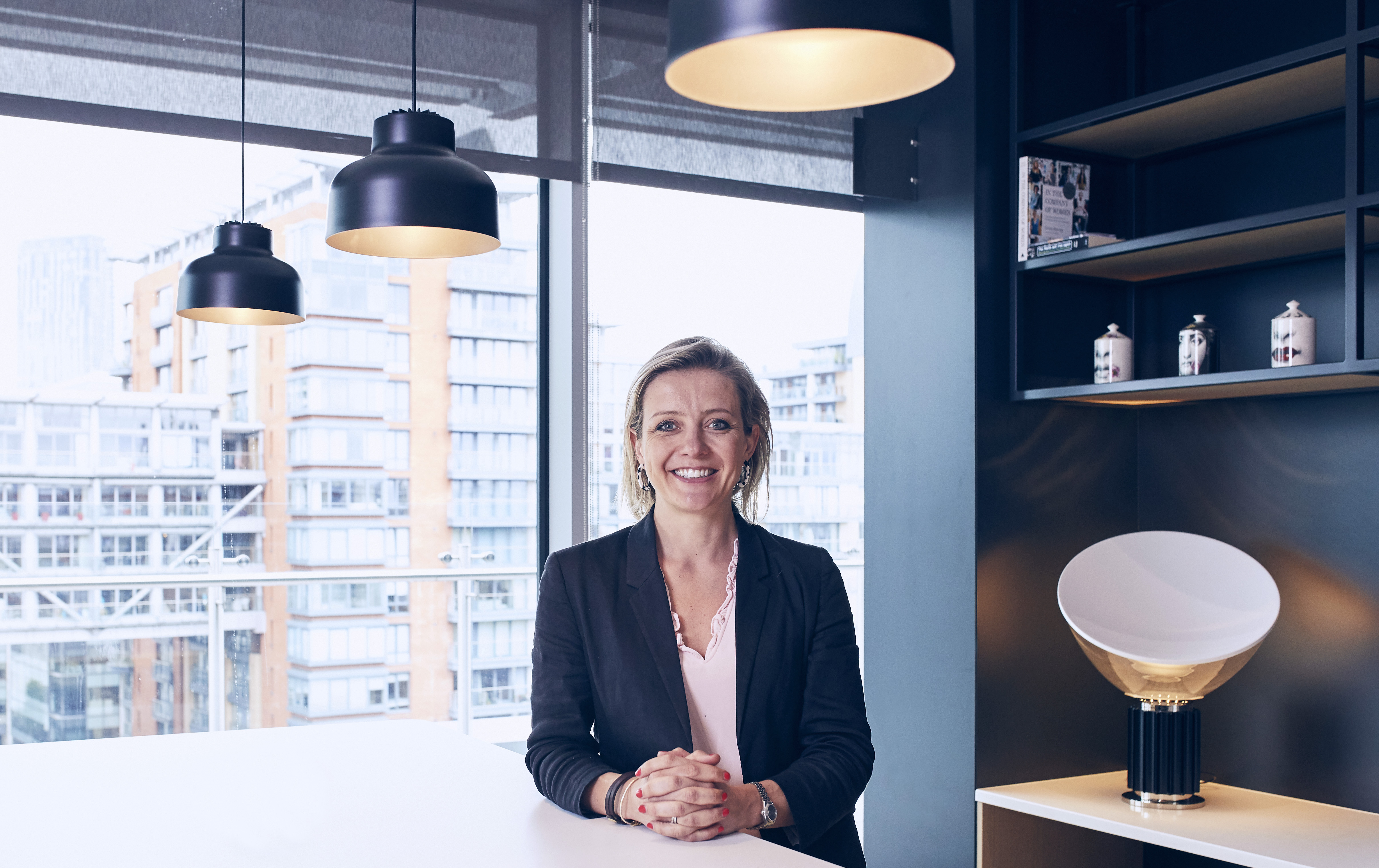 Olivia Balson, global centre director
Olivia Balson, global centre director"It's part of integrating the Hub with the rest of the firm – to act as a single entry point for all work," Balson adds.
Indeed, the Hub is evolving. In September 2018, the firm started recruiting associates. Some are shipped up from London on secondment, others brought in externally. They have four at the moment, with more in the pipeline. But the firm has also started a trainee secondment programme, using its prospective City lawyers on large due diligence cases.
Balson believes that the addition of associates is simply "an evolution of the success we're already achieving".
"It's about integration," she adds.
This content has been archived. It is available through our partners, LexisNexis® and Bloomberg Law.
To view this content, please continue to their sites.
Not a Lexis Subscriber?
Subscribe Now
Not a Bloomberg Law Subscriber?
Subscribe Now
NOT FOR REPRINT
© 2025 ALM Global, LLC, All Rights Reserved. Request academic re-use from www.copyright.com. All other uses, submit a request to [email protected]. For more information visit Asset & Logo Licensing.
You Might Like
View All
Big Law Sidelined as Asian IPOs in New York Dominated by Small Cap Listings

X-odus: Why Germany’s Federal Court of Justice and Others Are Leaving X

Mexican Lawyers On Speed-Dial as Trump Floats ‘Day One’ Tariffs

Threat of Trump Tariffs Is Sign Canada Needs to Wean Off Reliance on Trade with U.S., Trade Lawyers Say
5 minute readTrending Stories
- 1The New Rules of AI: Part 2—Designing and Implementing Governance Programs
- 2Plaintiffs Attorneys Awarded $113K on $1 Judgment in Noise Ordinance Dispute
- 3As Litigation Finance Industry Matures, Links With Insurance Tighten
- 4The Gold Standard: Remembering Judge Jeffrey Alker Meyer
- 5NJ Supreme Court Clarifies Affidavit of Merit Requirement for Doctor With Dual Specialties
Who Got The Work
J. Brugh Lower of Gibbons has entered an appearance for industrial equipment supplier Devco Corporation in a pending trademark infringement lawsuit. The suit, accusing the defendant of selling knock-off Graco products, was filed Dec. 18 in New Jersey District Court by Rivkin Radler on behalf of Graco Inc. and Graco Minnesota. The case, assigned to U.S. District Judge Zahid N. Quraishi, is 3:24-cv-11294, Graco Inc. et al v. Devco Corporation.
Who Got The Work
Rebecca Maller-Stein and Kent A. Yalowitz of Arnold & Porter Kaye Scholer have entered their appearances for Hanaco Venture Capital and its executives, Lior Prosor and David Frankel, in a pending securities lawsuit. The action, filed on Dec. 24 in New York Southern District Court by Zell, Aron & Co. on behalf of Goldeneye Advisors, accuses the defendants of negligently and fraudulently managing the plaintiff's $1 million investment. The case, assigned to U.S. District Judge Vernon S. Broderick, is 1:24-cv-09918, Goldeneye Advisors, LLC v. Hanaco Venture Capital, Ltd. et al.
Who Got The Work
Attorneys from A&O Shearman has stepped in as defense counsel for Toronto-Dominion Bank and other defendants in a pending securities class action. The suit, filed Dec. 11 in New York Southern District Court by Bleichmar Fonti & Auld, accuses the defendants of concealing the bank's 'pervasive' deficiencies in regards to its compliance with the Bank Secrecy Act and the quality of its anti-money laundering controls. The case, assigned to U.S. District Judge Arun Subramanian, is 1:24-cv-09445, Gonzalez v. The Toronto-Dominion Bank et al.
Who Got The Work
Crown Castle International, a Pennsylvania company providing shared communications infrastructure, has turned to Luke D. Wolf of Gordon Rees Scully Mansukhani to fend off a pending breach-of-contract lawsuit. The court action, filed Nov. 25 in Michigan Eastern District Court by Hooper Hathaway PC on behalf of The Town Residences LLC, accuses Crown Castle of failing to transfer approximately $30,000 in utility payments from T-Mobile in breach of a roof-top lease and assignment agreement. The case, assigned to U.S. District Judge Susan K. Declercq, is 2:24-cv-13131, The Town Residences LLC v. T-Mobile US, Inc. et al.
Who Got The Work
Wilfred P. Coronato and Daniel M. Schwartz of McCarter & English have stepped in as defense counsel to Electrolux Home Products Inc. in a pending product liability lawsuit. The court action, filed Nov. 26 in New York Eastern District Court by Poulos Lopiccolo PC and Nagel Rice LLP on behalf of David Stern, alleges that the defendant's refrigerators’ drawers and shelving repeatedly break and fall apart within months after purchase. The case, assigned to U.S. District Judge Joan M. Azrack, is 2:24-cv-08204, Stern v. Electrolux Home Products, Inc.
Featured Firms
Law Offices of Gary Martin Hays & Associates, P.C.
(470) 294-1674
Law Offices of Mark E. Salomone
(857) 444-6468
Smith & Hassler
(713) 739-1250








